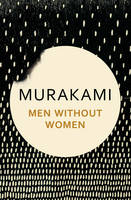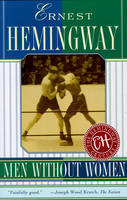When Haruki Murakami came out of his study earlier this year and said to his wife: "I'm going to call my latest collection of short stories 'Men Without Women'", I wonder if she thought to say to him: "Hasn't that title already been used darling?"
 Because it has. Ninety years ago in fact, when none other than Ernest Hemingway named his latest offering of short stories Men Without Women. I'm sitting looking at both these books right now as I write this blog. Hemingway's with its pugilistic cover and tribute by Joseph Wood Krutch (The Nation) - "painfully good". And Murakami's book, beautiful to behold, the hard cover version that I have bought (yes, I know!) strokable and with a satisfying heft.
Because it has. Ninety years ago in fact, when none other than Ernest Hemingway named his latest offering of short stories Men Without Women. I'm sitting looking at both these books right now as I write this blog. Hemingway's with its pugilistic cover and tribute by Joseph Wood Krutch (The Nation) - "painfully good". And Murakami's book, beautiful to behold, the hard cover version that I have bought (yes, I know!) strokable and with a satisfying heft.
 I love Murakami's writing, that deft thing he does where you are simultaneously drawn in and kept at arms length. And this book of seven stories about men and their complex relations with women is no exception. It is a long time since I have read Hemingway, but it is resolutely muscular writing. In his fourteen stories you are pulled right into the fray, be it in the boxing ring or in a touching dialogue on a railway siding.
I love Murakami's writing, that deft thing he does where you are simultaneously drawn in and kept at arms length. And this book of seven stories about men and their complex relations with women is no exception. It is a long time since I have read Hemingway, but it is resolutely muscular writing. In his fourteen stories you are pulled right into the fray, be it in the boxing ring or in a touching dialogue on a railway siding.
There are no books in Christchurch Citry Libraries with the title Women Without Men. To be frank I was so taken aback that I checked several times. The nearest I got to it is a book by Virginia Nicholson Singled Out (How Two Million Women Survived Without Men After the First World War).
Something about all of this is niggling me. Why did Murakami give his book this name?
Two such brilliant writers. Two great works - 90 years apart. Both made up of short stories. One title. I fear that Murakami, in this one act, has doomed himself to never-ending queries about his choice of title at writers' festival after writers' festival in the up-and-coming year.
I almost feel sorry for him.




Add a comment to: Men without women